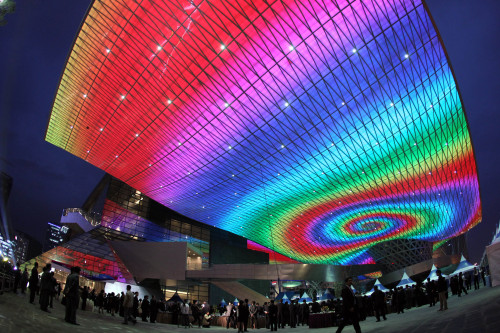BUSAN ― Asia’s largest annual film festival opens with a glittering cast in South Korea on Thursday as it seeks to cement its place on the world cinema stage against growing competition.
The Busan International Film Festival, now in its 16th edition, is moving into a new $140 million permanent home, the Busan Cinema Center in South Korea’s second city.
New festival director Lee Yong-kwan is pledging to use the venue to show art and independent film all year, keeping Busan at the center of Asian cinema as Chinese events seek greater prominence.
“BIFF’s role will now expand beyond the festival,” he said.
“Facilities such as our media centre, the cinematheque, and our archive space will enable the Busan Cinema Centre to become a symbolic structure representing the entire Asian film culture and business.”
This year’s event ― formerly known as the Pusan festival, when it used the host city’s Korean name rather than the Romanized version ― will see 307 films screened, representing 70 countries and including 135 world premieres.
Special programs include a look at Asian directors’ takes on the Western movie genre and a focus on modern Korean cinema.
 |
The opening ceremony of the Busan Cinema Center in U-dong, Busan, is held on Sept. 29. (Yonhap News) |
The festival’s main award is called New Currents, and offers two prizes of $30,000 to first- or second-time Asian directors.
And while Asian films are the festival’s mainstay ― it opens with the premiere of local director Song Il-gon’s romance “Always” and closes with Masato Harada’s Japanese drama “Chronicle of My Mother” ― international guests will also play a prominent role.
BIFF will welcome French director Luc Besson and actress Isabelle Huppert in town to promote their latest films.
Besson is bringing “The Lady” to Busan, his biopic of the Myanmar activist Aung San Suu Kyi, while Huppert comes with the drama “My Little Princess” ― the pair will also hold masterclasses for local cinema enthusiasts
Lee said the plan was to consolidate BIFF’s role as a platform for Asian cinema while helping Asian directors establish links with the international filmmaking community and, through them, an international audience.
“The ultimate mission of the Busan International Film Festival is to be the leader in shepherding the growth of the Asian films,” he said, adding the festival can “stand in the middle” by boosting the number of co-productions.
Yet as BIFF looks to the future it would do well to keep an eye over its shoulder, with the emergence of film festivals held annually in Beijing in April and Shanghai in June now offering greater competition.
Buoyed by the incredible growth of Chinese cinema ― box office takings surged 61 percent to $1.47 billion last year ― both festivals are positioning themselves and their respective film markets as major players in Asia.
But veterans of the Asian movie scene back BIFF to stay as a leading regional, and increasingly global, pivot-point for cinema where new talent can emerge and connect with the industry’s all-important moneymen.
“The most important role Busan can play is to continue as a showcase for young directors, writers and producers,” said American producer Andre Morgan, who first came to Asia to work with Bruce Lee on “Enter the Dragon” in 1972.
It was also a “venue for forging business relationships between young directors, distribution and finance companies around the Asia region” he added.
“This exchange is important in understanding the economic forces and popular media trends at play in the region.”
It is a two-way process, with European filmmakers looking to link up with Asia.
The European Film Promotion group is this year leading a delegation of directors to Busan ready to take questions from keen audiences on more than 80 European films to be shown at the festival.
Last year’s festival saw 200,000 people attend the nine-day event, and the the EFP’s managing director Renate Rose said: “There is an enthusiasm in the Korean audiences which has rare comparison in the festival world.”
(AFP)




![[Herald Interview] 'Trump will use tariffs as first line of defense for American manufacturing'](http://res.heraldm.com/phpwas/restmb_idxmake.php?idx=644&simg=/content/image/2024/11/26/20241126050017_0.jpg)

![[Health and care] Getting cancer young: Why cancer isn’t just an older person’s battle](http://res.heraldm.com/phpwas/restmb_idxmake.php?idx=644&simg=/content/image/2024/11/26/20241126050043_0.jpg)

